Photographs: Denis Balibouse/Reuters Dilip Kumar Jha in Mumbai
Indian diamond processors wish to increase the direct import of rough diamonds from Russia several-fold.
A pact in this direction was signed on Thursday between the Gems & Jewellery Export Promotion Council, sponsored by the Union ministry of commerce, and ALROSA, the Russian group of diamond producing companies.
The Russian Federation is the largest diamond-producing nation in the world, estimated to have produced a little over 33 million carats in 2013.
. . .
The image is used for representational purpose only
Diamond trade looks towards Russia
Image: The bulk of diamond cutting and polishing for the world's use is done in India.Photographs: Denis Balibouse/Reuters
And, ALROSA accounts for 97 per cent of all Russian production (and, it appears, 27 per cent of global output).
The agreement is to ease the flow of trade and statistical data on diamonds between India and Russia.
The bulk of diamond cutting and polishing for the world’s use is done in India.
India’s direct import of roughs was $767 million from Russia in 2013, a little less than five per cent of India’s total import of roughs.
However, processors in this country say they’re looking at a a target of $5 billion worth of roughs directly from Russia in a couple of years.
. . .
The image is used for representational purpose only
Diamond trade looks towards Russia
Image: An employee of Sotheby's auctioneers displays the Beau Sancy diamond in Zurich, Switzerland. The historic 34.98 carat modified pear double rose cut diamond, which has an estimate of $2-4million, goes on auction in Geneva.Photographs: Arnd Wiegmann/Reuters
At present, Indian processors participate in auctions of Russian-origin roughs outside Russia to meet their requirements.
“We want India to continue its pressure on Russia for increasing the direct import of rough diamonds.
“It will soon rise to $1 bn,” said Praveen Shankar Pandya, chairman, Diamond India Ltd and convener of GJEPC.
Direct import will save on transportation cost by at least two to three per cent and improve Indian processors’ margins.
Maintaining the latter has been a problem, due to sluggish demand. India has been seeking long-term contracts between ALROSA and the Indian cutting and polishing industry for a long while.
. . .
The image is used for representational purpose only
Diamond trade looks towards Russia
Image: 'Summer Storm', a white gold necklace with four pear-shaped and six round diamonds valued at $750,000, in Antwerp, Belgium.Photographs: Francois Lenoir/Reuters
During the visit of Russia’s Deputy Prime Minister Dmitry Rogozin in February last year, commerce minister Anand Sharma proposed state-owned Minerals & Metals Trading Corporation be made a nodal Indian agency, with a long-term contract.
The proposal hasn’t progressed.
India imported 163.11 million carats of roughs worth $16.3 bn and exported 36.46 million carats of polished diamonds worth $20.2 bn during calendar year 2013. Provisional data puts India’s export of gems and jewellery during calendar year 2013 at $36 bn.
. . .
The image is used for representational purpose only
Diamond trade looks towards Russia
Image: 'The Mike Tood', an antique diamond tiara which belonged to the late actress Elizabeth Taylor, in Hong Kong.Photographs: Tyrone Siu/Reuters
“Direct imports would bring benefits to both ALROSA and the Indian cutting industry,” said Vipul Shah, chairman of GJEPC. Indian dealers already have a significant presence at the Moscow Diamond Bourse and relations between the diamond dealing communities of both nations are warm and close.
Procedural matters, says the trade, are all that stand between a sharply increased trade in polished diamonds between the two countries.
“The Indian diamond industry has long said that the indirect routing of rough diamonds into India simply adds to cost and increases the complexity of sourcing steady raw material supplies.
. . .
The image is used for representational purpose only

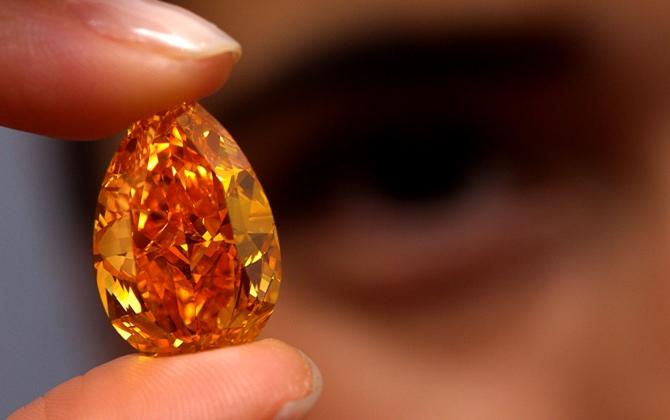
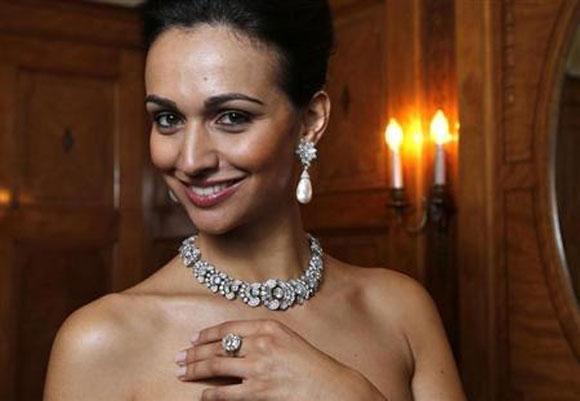
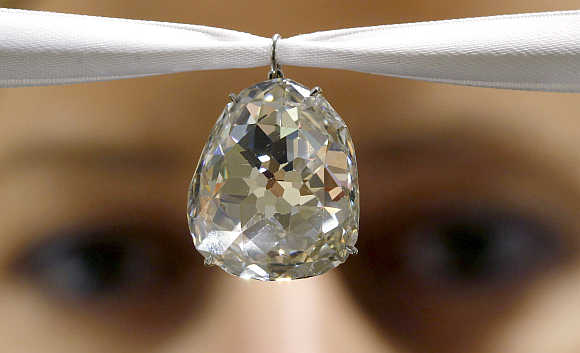
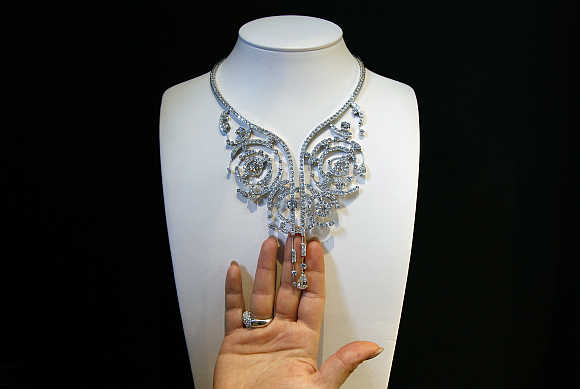
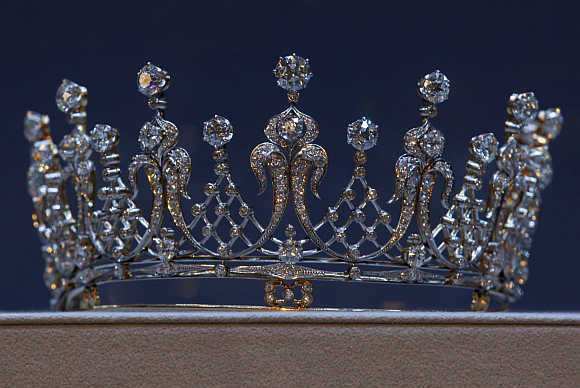

article